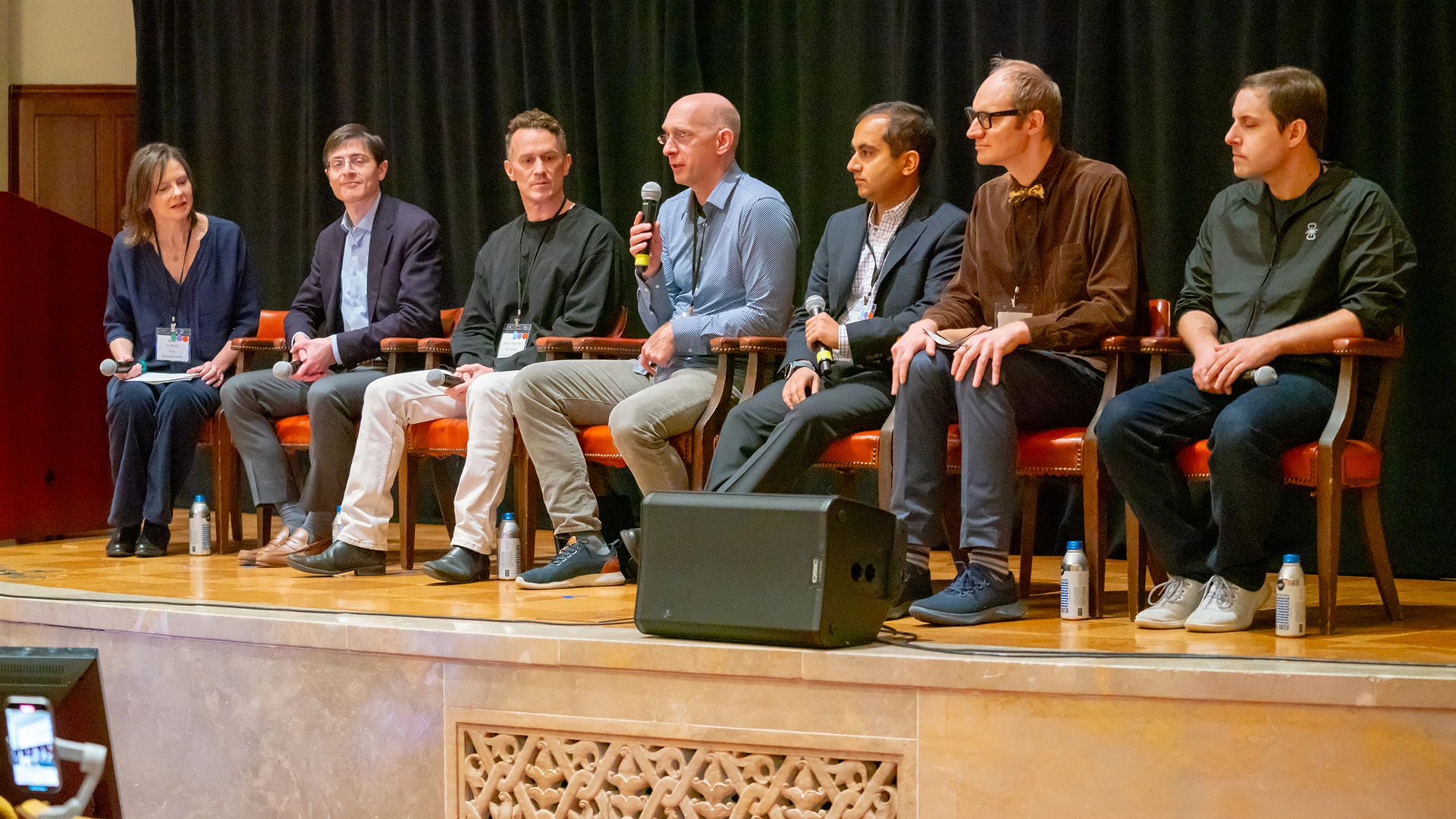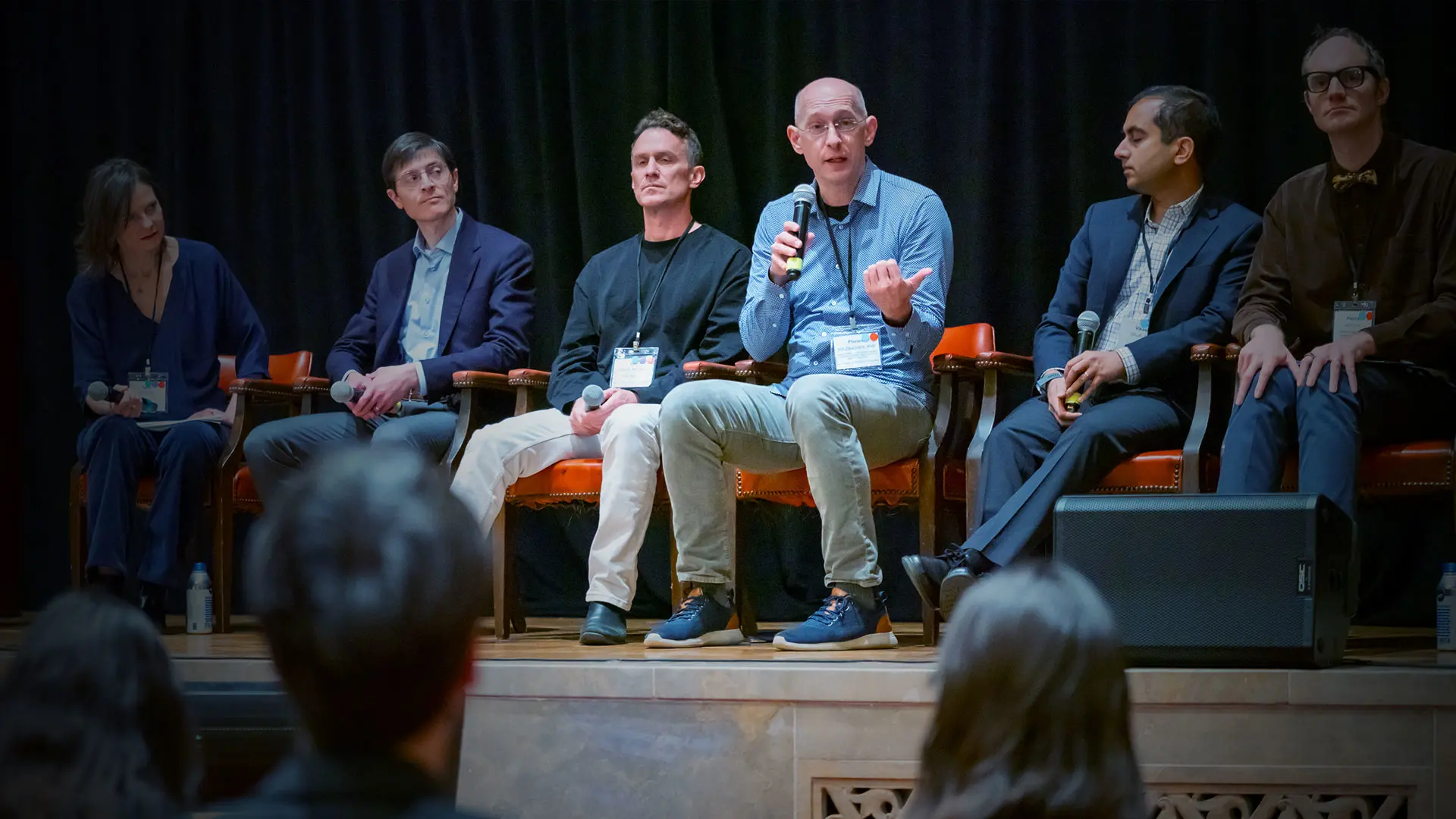
World leaders from top neurotech startups discuss industry challenges. From left: moderator Sarah McBride (Bloomberg News); Benjamin Rapoport, MD, PhD (Precision Neuroscience); Tom Oxley, MD, PhD (Synchron); Florian Solzbacher (Blackrock Neurotech); Vikash Gilja (Paradromics); Patrick Kaifosh (CTRL Labs/Meta); and Max Hodak (Science).
The symposium, which was held at the New York Academy of Medicine, reflected the vision of Mount Sinai’s Joshua B. Bederson, MD. He served as overall moderator for the two-day session that featured 34 distinguished experts, including researchers, neurosurgeons, BCI company founders, patient advocates, and federal leaders who presented and exchanged perspectives on the present-day limitations and future potential of neural interfaces.
Among the topics were: The Evolution and Future of Invasive BCI, Optimizing and Defining BCI Trial Outcomes; Surgical Techniques for Implantable BCI, Supporting a Product from Bench to Clinical Usage in a Patient’s Home, BCI & Patient Advocacy Point of View, and Bringing BCI to Patients: The Pathway Forward.
“Mount Sinai has been at the forefront of advancing the field of BCI research and practice,” says Dr. Bederson, the driving force behind creating and planning the symposium. “This event exemplifies our institution’s distinctive approach to neurotech innovation, and it was exciting to convene such an esteemed group of world experts. We are committed to establishing this as a premier annual gathering.” Dr. Bederson is the Leonard I. Malis, MD/Corinne and Joseph Graber Professor of Neurosurgery and Chair of Neurosurgery for the Mount Sinai Health System and Executive Director of Mount Sinai BioDesign, a medical technology prototyping center and incubator housed within the Mount Sinai Health System.

Joshua B. Bederson, MD, addresses the symposium attendees.
Prominent figures in attendance included: Chad E. Bouton, MS, a leader in neuroprosthetics; Max Hodak, co-founder of Neuralink, Chief Executive Officer of Science, and an innovator in BCI; David McMullen, MD, Director, Office of Neurological and Physical Medicine Devices within the U.S. Food and Drug Administration; Anthony (TJ) Sutphin, Pharmaceutical and Technology Ombudsman at the Centers for Medicare & Medicaid Services; Douglas J. Weber, PhD, an authority in neurotechnology and rehabilitation; and Jennifer French, a paraplegic champion for neurotech progress.
A standout session, the “BCI Startup Spotlight,” was moderated by Bloomberg News reporter Sarah McBride, featured founders/leaders from six BCI companies, and covered the industry's emerging challenges, including the standardization of outputs from varied systems, fostering collaboration while managing competition, demonstrating value to both patients and payors, and balancing technical innovation with real-world constraints.
The symposium highlighted that the future of BCIs—characterized by interdisciplinary collaboration, patient-focused research, and scalable technologies—is already unfolding at Mount Sinai. The breakthroughs showcased at the event reinforced Mount Sinai's pivotal role in transforming BCIs from visionary ideas into practical solutions that enhance patient outcomes. To read a summary of the event and to learn about Mount Sinai’s leadership in this arena, go to Forbes.
Mount Sinai neurosurgeons and neuroscientists, for example, are the first in New York State to study a new BCI technology that aims to record and map a large area of the brain’s surface, in real time, at resolutions hundreds of times more detailed than typical arrays used in neurosurgical procedures.
The technology converts biological neural signals to digital bits, then uses machine learning to “decode” digitized neural signals. It is being used on an investigational basis, through abbreviated investigational device exemptions (IDEs) or nonsignificant risk IDEs, under local institutional review board approval, and with the informed consent of the patients involved.
For this study, the technology being used is the Layer 7 Cortical Interface, developed by Precision Neuroscience. It contains 1,024 tiny electrodes spanning an area of 1.5 square centimeters, embedded in a flexible film that conforms to the brain’s surface. The film is one-fifth the thickness of a human hair and was designed to be implanted and removed by neurosurgeons without damaging brain tissue.
“Ultimately, BCI technology is meant to function as a digital bypass for patients with certain forms of paralysis, including from spinal cord injury, amyotrophic lateral sclerosis, brainstem stroke, hemorrhages in the subcortical white matter, and a variety of other conditions in which the neocortex remains intact,” says Benjamin I. Rapoport, MD, PhD.
Precision Neuroscience was co-founded by Dr. Rapoport, where he also serves as its Chief Science Officer. Dr. Rapoport is Assistant Professor of Neurosurgery at the Icahn School of Medicine at Mount Sinai, and a practicing neurosurgeon who has a PhD in electrical engineering and computer science. He also serves as the Scientific Director of Mount Sinai BioDesign.
Dr. Rapoport has a track record of technology translation in the areas of digital health, including serving as co-founder of Simbionics (acquired by Apple), and neurotechnology, including serving as a co-founding member of Neuralink.
“As one of the leading sites participating in the trials for the new electrode array, we are eager to see what we will learn from the detailed information we will collect and analyze,” says Dr. Bederson.
Watch as Benjamin I. Rapoport, MD, PhD, Co-Founder of Precision Neuroscience and a pioneer in neurotechnology, and Joshua B. Bederson, MD, Chair of Neurosurgery at Mount Sinai, discuss the BCI Layer 7 Cortical Interface as they provide an operating room perspective.
As part of the open-label, single-arm feasibility study, Dr. Bederson and several other study investigators are temporarily placing the investigational device on the surface of the study participants’ brains during intracranial procedures where surface mapping is routinely performed and correlated to evoked potentials or standardized behavioral tasks that are routinely performed as part of these procedures. The device records high-resolution electrophysiological signals and the data collected is compared to that obtained using standard-of-care cortical surface arrays.
In 2022, separate from this study—and among other accomplishments in the field—Mount Sinai was the first institution in the United States to implant a patient with the Stentrode, a small BCI device that is implanted through blood vessels in the brain, using a minimally invasive approach that does not require open brain surgery. The procedure was coordinated by Thomas J. Oxley, MD, PhD, Clinical Instructor of Neurosurgery, Director of Innovation at Mount Sinai BioDesign, and Co-Founder and Chief Executive Officer of Synchron, the manufacturer of the Stentrode. Shahram Majidi, MD, Assistant Professor of Neurosurgery, performed the procedures to implant the devices into the study participants’ brains as part of a National Institutes of Health-funded clinical trial.
Dr. Bederson is Chair for the Department of Neurosurgery at the Mount Sinai Health System. Drs. Rapoport and Oxley are faculty members in the Department of Neurosurgery. Dr. Bederson serves in a supervisory role for them within the Health System. Dr. Rapoport is an equity owner in Precision Neuroscience, serves as its Chief Science Officer, and is a member of its board of directors. Neither Dr. Bederson nor Mount Sinai has a financial interest in Precision Neuroscience. Dr. Oxley is an equity owner in Synchron, serves as its Chief Executive Officer, and is a member of its board of directors. Dr. Bederson and other faculty members at Mount Sinai are equity owners in Synchron. All Precision Neuroscience and Synchron research at Mount Sinai is conducted by investigators without financial ties to either company.
